The village of Perevi is simmering under unusually sunny skies for early November. Along the steep rocky paths, pigs forage freely as burly horses arch their backs lugging logs up the hill. This is the ordinary choreography of rural life in Georgia. Only this is no ordinary place.
Until recently, Perevi (pop. ca. 1,100) was the only village controlled by Russian troops on Georgian soil, in violation of the Medvedev-Sarkozy accords that put an end to the conflict in August 2008.
On 18 October, Moscow finally pulled its soldiers from the checkpoint at the entrance to the village, redeploying them a few hundred yards back, in South Ossetia, the breakaway region that proclaimed its independence after that war. An odd sort of independence under the aegis of Moscow: crossing a bridge to enter the area, you come upon two flags, the Ossetian and the Russian flag, at the foot of a checkpoint.
“Perevi was of interest to the Russians, guaranteeing them a direct route between two of their army camps,” explains Georgios Papaioannou as we follow him down the narrow streets of the village. This Greek naval officer is the head of theEuropean Union Monitoring Mission in Georgia (EUMM) in the district of Sachkhere, a three-hour drive from the Georgian capital, Tbilisi. Since 18 October, he has been making weekly visits to Perevi to assess the situation. The locals are now familiar with his blue beret.
Started up in October 2008, the EUMM is an unprecedentedEuropean civil mission comprising 300 staff, who are tasked with making sure the six-point peace plan is being properly implemented. Its patrols establish contact with the local Georgian authorities and the people living along the administrative dividing line. The Russians and Ossetians, on the other hand, won’t let them cross the border here – just as in [the other breakaway region of] Abkhazia. Moscow has deployed 3,600 troops in each of the two separatist regions.
We don’t venture into the woods much to gather nuts and berries.”
Standing by the fence in front of her house, Lola Makasarachvili (46) assures us there have been no incidents to report here. "We’ve never been bothered by the Russians. The only problem is getting around: they are constantly checking our papers.” She says locals remain wary even after the Russian retreat. "We don’t venture into the woods much to gather nuts and berries.” Another villager, Vladimir Beridze (70), sums up a widespread sentiment: "The Russian presence did have one saving grace: it kept the Ossetians away,” he says, holding a plastic bottle of homebrewed chacha, traditional Georgian brandy.
Down in Tbilisi, the government are glad the Russians have pulled back, though careful not to blow the event out of proportion. "The withdrawal from Perevi is a step in the right direction, but that only makes up 1% of the occupied territory,” stresses deputy foreign minister Giga Bokeria. “We have no illusions. We won’t be able to make the problems go away just like that.” For a long time, Moscow used Perevi as a bargaining chip in talks with the West. The first time around, Russian soldiers left in December 2008 – only to return 24 hours later.
Thus far, the withdrawal has not resolved all the mobility problems. Some Ossetian children attend the village school, while some of the villagers want to travel freely to South Ossetia to see their relatives or sell their produce. The Russians check everyone coming through and sometimes refuse to let certain loads through. "After the war, you couldn’t be carrying more than 30 kg at most,” explains district police chief Vassili Bakhturidze.
No serious shooting since 2009
Since the spring of 2009, the situation has been calm along the administrative boundary. All told, 140 shots have been reported in 2010, but most were celebration shots or firing practice. “The conflict is at a standstill for the time being,” reckons German diplomat and EUMM chief Hansjörg Haber. “We’ve stabilised the situation, but in the long run this mission will not be enough. A political strategy is needed.” Otherwise, the EUMM will be stuck there for many long years. But the ongoing talks in Geneva between the parties involved are hardly making any headway. Russia would like to appear as a mediator there alongside the EU, though in fact it is a party to the conflict.
The refugee issue remains a major preoccupation, especially in the district of Akhalgori, which fell into the hands of the South Ossetian militia during the war. “All in all, 30,000 Georgians fled South Ossetia. None of them have come back,” observes Hansjörg Haber. “From time to time, some of them go to Akhalgori just to check on their houses, but they take off again very fast. The security is insufficient.”
This district was previously inhabited by Georgians for the most part, but once cut off from Tbilisi’s authority, it was deserted in the wake of looting and threats. Some 5,000 residents, out of a total of 7,000, sought refuge in other parts of Georgia.
Do you like our work?
Help multilingual European journalism to thrive, without ads or paywalls. Your one-off or regular support will keep our newsroom independent. Thank you!
















